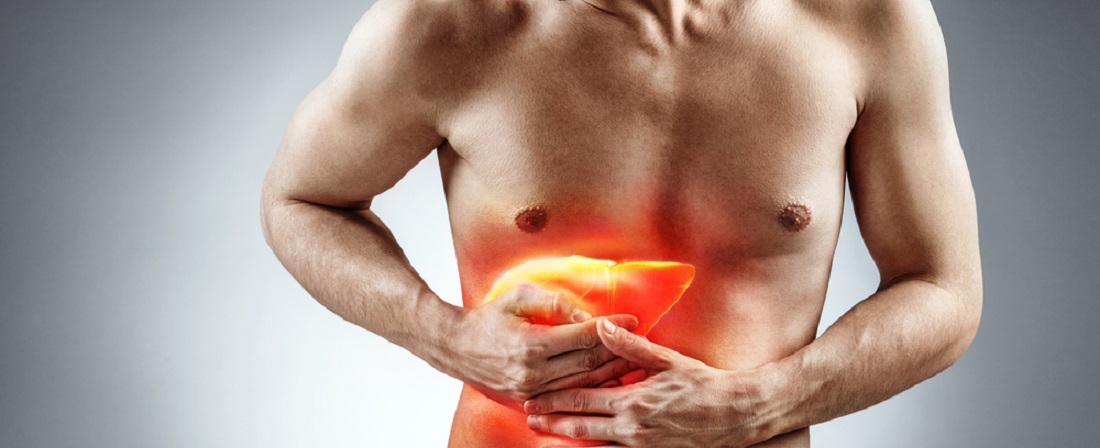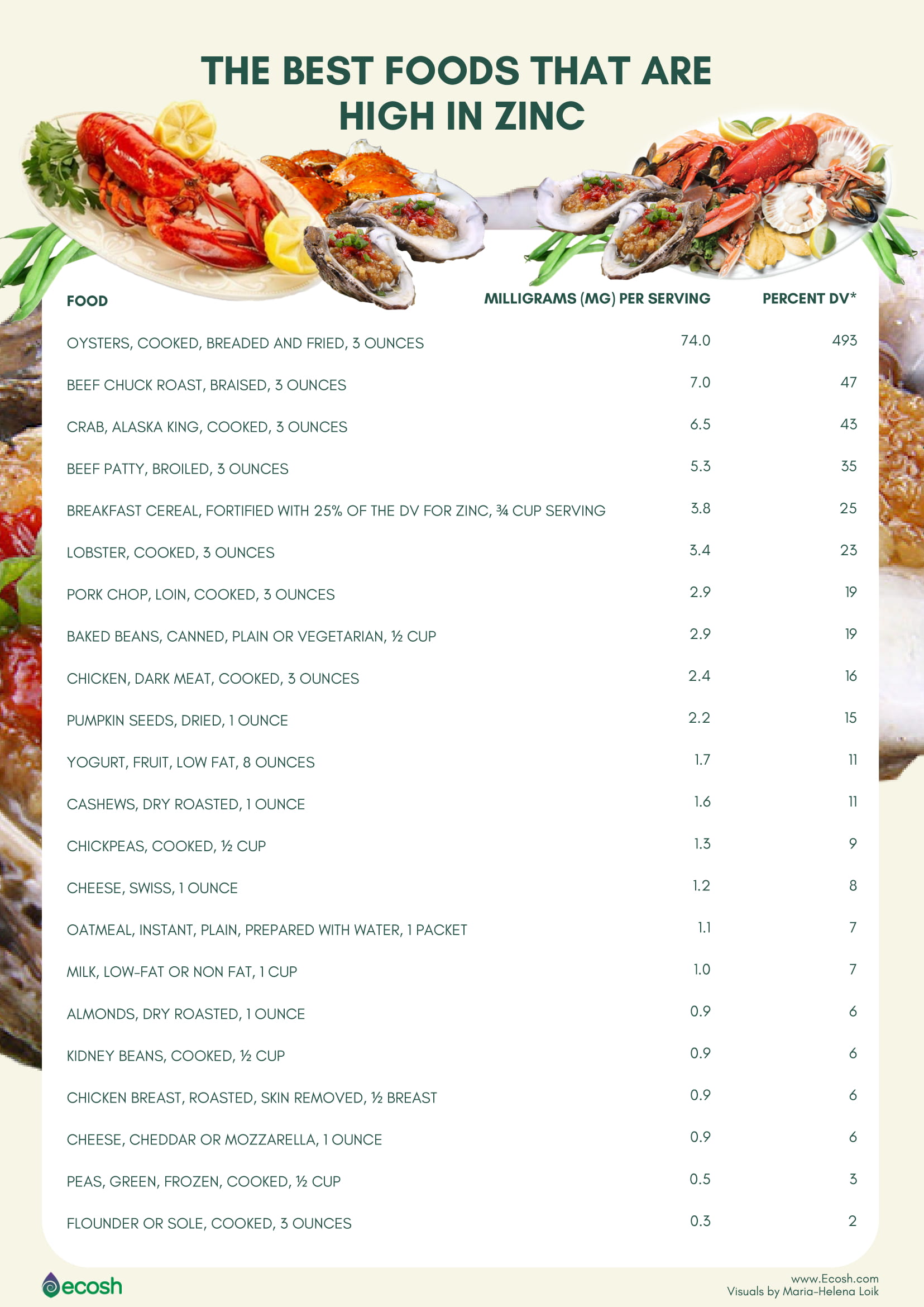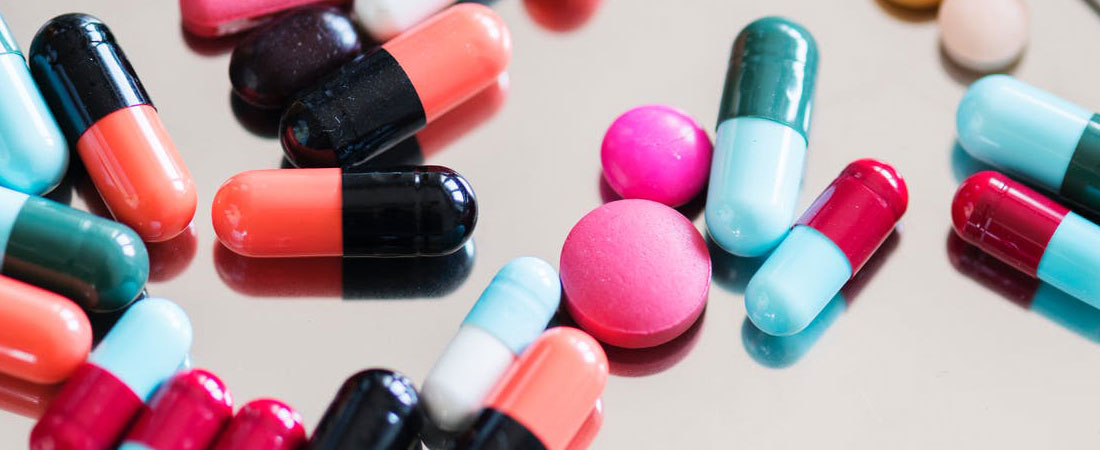ZINC DEFICIENY – SYMPTOMS, CAUSES, RISK FACTORS, COMPLICATIONS, NATURAL TREATMENT AND FOODS RICH IN ZINC
Zinc is one of the key minerals in the body’s cellular development, growth, and reproduction. There are about 2 to 3 grams of zinc (Zn) in the human body, 60% in the muscles, 30% in the bones, and about 0,1% in the plasma. In addition to skeletal muscles and bones, Zn is also found in our kidneys, pancreas, retina, teeth, hair, skin, liver, prostate, and testicles (1, 2, 3, 9, 10).
The human body is not specialized to produce or store Zn, so it is necessary to get it from food or supplements (11).
Zinc and its beneficial effects are known in the treatment of a wide variety of diseases. For example, Zn is used as a treatment for growth problems and a remedy for diarrhea in children. Also for strengthening the immune system, treating colds, ear infections, lower respiratory diseases, in the treatment of malaria, in wound creams for acne and psoriasis, and the treatment of sunburns, blisters, and other skin infections (1, 2, 3, 5, 6, 7, 8).
However, there is no scientific evidence that zinc can treat all of these health conditions, such as malaria, so do not start to self-medicate and consult your doctor before taking any supplements (4).
Since Zn benefits the normal growth of the cells, its deficiency weakens the cells and may lead to hair loss and scalp cell damage. According to a study, the use of a 1% pyrithione zinc shampoo with daily use of 26 weeks may improve hair growth, and zinc supplementation in case hair loss has also shown promising results in some studies (12, 13). Moreover, Zn may also be useful for collagen formation, which is important for our skin, joints, bones, teeth, and blood vessels (14).
In addition, it is important to know here that these symptoms may not only be related to zinc deficiency but also some other medical condition, so do not start to self-medicate and consult your doctor.

Zinc Benefits – Why Is Zinc Important and Which Body Functions Need It?
Sexual Motivation and Hormones
- Zinc is a necessary trace element in the synthesis and function of thyroid hormones, sex hormones, and growth factors (15, 16). Trace elements (also iron, iodine, fluoride, copper, chromium, selenium, manganese, and molybdenum) are part of enzymes, hormones, and cells in the body. They are vital for maintaining health.
- This mineral plays a very important role in the body’s hormonal function. For example, as Zn plays a clear role in the synthesis, storage, and secretion of insulin, it may directly affect the production and functional activity of insulin and thus the spectrum of all insulin-dependent processes (17).
- In men, Zn is involved in the synthesis of testosterone and the processes of gonadal function, so it is possible to associate zinc levels in organisms between potency and gonadal disorders in children (18).
- In addition, zinc supplementation is associated with a significant reduction in preterm birth (19).
Oxidative Stress and DNA Damage
- Zn is a vital component of numerous proteins involved in the defense against oxidative stress and DNA damage repair. For instance, studies in vitro have shown that zinc deficiency may cause DNA damage (20, 21, 22).

Digestive Organs, Blood Composition, Immune System, etc.
- Zinc levels in the body may affect the function of digestive organs (Zn activates digestive enzymes), taste and smell senses, response rate, mood disorders, advancement in the learning process, and others (23, 24, 25).
- Your body also needs Zn for skin, hair, and nail growth (26, 27, 28).
- Zn plays a major role in regulating every phase of the wound healing process (29).
- Zinc may stabilize arterial blood pressure and blood composition, prevent food allergies, and is essential for the functioning of the central nervous system and learning process (32, 33, 34, 35, 36). The work of Zn on monitoring processes in the body can be compared to the work of a policeman on the street.
- Zn is a strong antioxidant. Being a retinol-binding protein (RBP), Zn together with vitamins A and C help to prevent and reduce immune deficiencies by stimulating antibody synthesis and antiviral activity. This means that this mineral helps the immune system fight viruses, bacteria, allergens, and carcinogens (30, 31).
- It also may help (in small amounts) to remove toxic heavy metals from your body, such as cadmium and lead (37).
- In addition, Zn may regulate appetite (38).
Eye Vision
- Zn plays an important role in eye health because of the large amount of Zn present in the retina of the eye. It helps vitamin A to produce a pigment called melanin, the role of which is to protect the eye. For instance, studies have shown that taking Zn with antioxidants such as vitamin C, A, and E may reduce the degeneration of the macula, and slow down the loss of vision in old age. In severe cases, Zn deficiency may also cause changes in the retina of the eye. However, here it is important to remember that too much zinc has a bad effect on eye health, so you should not overdo it by taking Zn preparations (39, 40).

Zinc Deficiency Complications
- Immune system: Low immune system and weak ability to defend against infections. Acute respiratory diseases, influenza, viral diseases, and lymph node enlargement. The need for Zn is higher in the case of chemotherapy and radiotherapy.
- Cardiovascular system: Elevated cholesterol levels.
- Liver: Hepatitis, cirrhosis, alcoholism, drug addiction, gastritis.
- Pituitary gland, also called Hypophysis: Growth disorders in children, disorders in boys’ sexual maturation, loss of potency, infertility.
- Diarrhea.
- Skin: Dermatitis, eczema, furuncles, acne, slow wound healing, trophic ulcers.
- Hair: Dandruff, hair loss, and premature graying.
- Central nervous system: Decreased appetite, poor memory.
- Prostate: Risk of adenoma, and prostate cancer (49, 50).
- Pancreas: Diabetes and pre-diabetes.
- Retina: Decreased visual acuity (41, 42, 43, 44, 48).
However, more studies are needed to confirm these theories, so do not start to self-medicate.

Zinc Deficiency Causes
Zn deficiency may occur in case of:
- Excessive consumption of plant-based diet (vegetarian), salty and sweet food
- Chronic diseases such as Crohn’s disease, short bowel syndrome, chronic diarrhea, and Sickle cell disease
- Consumption of alcohol and drugs
- Permanent stress
- Excessive sweating
- Breastfeeding women
- As a result of aging (46, 47)
Zinc Deficiency Risk Factors
Up to 70% of people may suffer from Zn deficiency today, especially:
- Babies, children, and young people
- Pregnant women
- Anorexics
- Alcoholics
- People with persistent and/or prolonged diarrhea
- In addition, those who suffer from digestive disorders (47)

Source: National Institutes of Health
Recommended Daily Doses of Zinc
Recommended Dietary Allowance (RDA) quantities of Zn:
- Boys and men age 14 and older – 11 mg/day
- Women 19 and older – 8 mg/day
- Pregnant women 14 to 18 – 13 mg/day
- Pregnant women 19 and older – 11 mg/day
- Lactating women 14 to 18 – 14 mg/day
- Lactating women 19 and older – 12 mg/day
- People with mild zinc deficiency – 2 to 3 times the recommended dietary allowance (RDA) of zinc for 6 months
- In addition, people with moderate to severe deficiency – 4 to 5 times the RDA for 6 months
Tolerable Upper Intake Levels (UL) of zinc for people who are not receiving zinc under medical supervision for adults 19 years and older (including pregnancy and lactation) is 40 mg/day (48).
There are few Zn poisonings, however, characteristic symptoms include nausea and vomiting, diarrhea, headache, fever, and weakened immune system. In this case, these consequences should happen within 3 to 10 hours after taking the dietary supplements and disappear within a short period after discontinuation of the food supplements.
Using Zn nasal spray may lead to permanent loss of sense of smell.
In conclusion, long-term excessive intake of Zn is not suggested and may also affect the absorption of other minerals, such as iron and copper (48).

Zinc Deficiency Symptoms and Signs
- White spots on the nails and skin are the signs that you already suffer from existing Zn deficiency.
- Zn is also used by the body in salivary glands' function. Appetite changes may also indicate Zn deficiency if, for example, there is a greater need than usual to consume sweet or salty foods. Also, changes in taste and smell, weight gain, and decrease. Our taste sensation depends on this mineral. The absence of Zn will reduce the function of the flavor receptors and we will no longer be able to distinguish between the flavor and the taste of the food. Older people lose zinc levels in the body, so they start to feel less taste and therefore consume more salt and sugar.
- Zinc helps with circulatory disorders, so those with problems with blood circulation and fainting could take Zn in the form of supplements. Zn preparations are recommended also for alcohol users, iron supplement consumers, liver cirrhosis, and gastrointestinal diseases.
- In addition, pregnant women with skin problems and frequent nausea should also consume Zn supplements.
- Increased stress can also lead to Zn deficiency, in this case, you should use dietary supplements for prevention.
- To find out if there is a zinc deficiency in the body, try the so-called tasting test at home. For this, mix 50 milligrams of Zn sulfate with half a glass of water. If the liquid seems sweet and has a pleasant taste to you, or it seems like ordinary water – it means that the body needs more zinc. If the liquid seems metallic and rather unpleasant to you, it means that there is already enough zinc in your body.
- A more solid method of Zn deficiency testing is to have a blood test done by the doctor.

Source: National Institutes of Health
Foods High In Zinc
The best natural sources of zinc are bitter cherry grass, birch, raspberry, buckwheat, cocoa, common sesame, wheat germ, pumpkin and flaxseed, blueberry, sage, beef, fish, seafood like lobsters and crabs, cheese, and eggs.
Zinc Supplements
You’ll likely notice that there are several different types of zinc supplements available. Which one to take? In capsule, tablet, or lozenge form? There are plenty of options to get your daily dose of zinc regardless of the form you pick. However, you might want to choose the Zinc glycinate bioactive form as it is highly soluble.
Different types of Zinc on the market:
- Gluconate: Zn gluconate is often used in cold remedies, such as lozenges and nasal sprays.
- Acetate: Zn acetate is often added to cold lozenges to reduce symptoms and speed up the rate of recovery.
- Sulfate: Zn sulfate has been shown to reduce the severity of acne.
- Picolinate: Some research suggests that your body may absorb this form better than other types of zinc, including zinc gluconate and zinc citrate.
- Orotate: This form is one of the most common types of zinc supplements on the market.
- Citrate: There is a study that showed, that this type of zinc supplement is as well-absorbed as zinc gluconate but has a less bitter, and more appealing taste.
- Diglycinate: Zinc glycinate, which is bioactive and easily absorbable, is an essential mineral to keep the whole organism functioning.

Avoid Over Consumption
Zn preparations can affect some drugs, such as antibiotics and anti-baby pills. This mineral may also affect the absorption of other food supplements such as calcium, magnesium, copper, and iron.
Zinc metabolism in the body is associated with iron and copper, so the absorption of Zn may be reduced when taking iron preparations.
The higher Zn content in turn prevents copper absorption and promotes copper excretion (eg, treatment of Wilson’s disease). Therefore, it is strongly recommended to consult a physician or other expert before taking any zinc supplements.
NB! The information provided here is for informational purposes only, so do not consider it as health care or medical diagnosis and treatment. Do not consider this information as a guarantee of the results you want to achieve. In addition, do not take this information as a replacement for the advice of your physician or other healthcare professional.
Even more, you should not use it to diagnose or treat a health problem. Before changing or discontinuing your existing medication, treatment, or care, or taking any dietary supplements, be sure to consult with your healthcare professional or doctor before starting any diet or program, or if you suspect you may have a medical condition.
Written by Maria-Helena Loik
This article was first posted on Ecosh.com
Pictures: Pixabay.com, Pexels.com
Sources:
